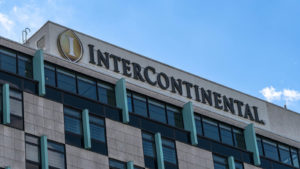The travel and tourism industry continues to recover following the devastating blow of the coronavirus pandemic in 2020. The U.S. travel sector has taken off again, but the journey toward stock-price recovery is still filled with turbulence. Nevertheless, it’s imperative to separate the wheat from the chaff and avoid a long list of doomed travel stocks.
Americans are again embracing the joy of travel again, with passenger numbers mirroring pre-pandemic levels. However, the financial health of most travel companies is still on shaky ground, with the focus of many companies split between rewarding shareholders and paying down the mountain of debt accumulated during the pandemic survival phase.
With the prospect of a looming recession, investors need to tread carefully. The 2008 recession saw consumer expenditures drop significantly, so it is imperative to steer clear of high-risk travel stocks. With that said, here are seven unstable travel stocks I think are worth avoiding right now.
Lyft (LYFT)

Lyft’s (NASDAQ:LYFT) recent leadership shakeup has attracted a swirl of predictions over its trajectory, tied to its ambitious push for operational efficiency. This drive, however, has garnered mixed sentiment from investors, with polarizing views over the company’s ability to outpace its competitors. Lyft’s refocused strategy points to a roadmap designed to streamline operations, while effectively reinforcing its service quality.
On the flip side, its primary competitor Uber (NYSE:UBER) boasts a broader footprint, dominating both domestic and international markets and offering a comprehensive platform to build a strong digital reputation. Conversely, Lyft’s localized presence prompts users to diversify their ride-sharing preferences.
Most recently, Wedbush analyst Dan Ives likened Lyft’s new management’s challenge to climbing Mount Everest, pointing out the monumental effort required to revamp the company’s business model. Tipranks analysts point to downside of roughly 3% from current price levels.
Frontier Group Holdings (ULCC)

Frontier Group Holdings (NASDAQ:ULCC), the parent company of Frontier Airlines, has failed to deliver the goods for its shareholders, unlike its peers. It faces multiple challenges, including a potential dip in flight demand and subpar customer ratings.
Echoing this sentiment, InvestorPlace’s own Larry Ramer narrates a personal experience with Frontier, underscoring an 8.5-hour flight delay bereft of compensation. His account is a testament to the airline’s low consumer ratings on platforms like TripAdvisor (NASDAQ:TRIP), and its glaring operational and customer service deficiencies.
The company’s profitability situation is alarming, with core metrics firmly in the red. For instance, free cash flow and net income margins stand at a negative 2.7% and 2%, respectively, significantly behind sector averages.
TripAdvisor (TRIP)

TripAdvisor is a renowned global travel guidance provider, which is currently in turbulent waters as it grapples with the harsh realities of shrinking margins. Over the past decade, its competitive foothold in its core markets has dwindled. This is due to growing competition and the noticeable scarcity of lucrative monetization opportunities.
This stark reality is that online travel agents continue to outstrip Tripadvisor’s growth with their specialized product range.
TripAdvisor’s first-quarter results cast a shadow over its future prospects, revealing a 5% year-over-year increase in selling and marketing costs, accounting for a hefty 59% of total revenue. Management attributes the surge to climbing costs in paid online traffic acquisition and a sizeable uptick in marketing spend. Moreover, the financial analysis platform GuruFocus assigns a meager 2/10 growth rank on the company, emphasizing the company’s underwhelming historical performance and tepid liquidity metrics.
Carnival Corporation (CCL)

Cruise line behemoth Carnival Corporation (NYSE:CCL) has been charting a strong recovery course, surging more than 100% since the start of the year. Evidently, 2023 has ushered in a sea change for its business, as pandemic-led fears have substantially diminished. The ripple effect of this positive shift is evident in the company’s first-quarter results, where net revenue yields rose over the 2019 numbers, registering a favorable cash inflow from operations.
Yet, stormy waters are on the horizon. The firm forecast a per-share loss ranging from 8 to 20 cents for the year. Adding to these woes, Carnival’s debt load has ballooned over three times in just half a decade, a massive burden exacerbated by escalating interest rates. Additionally, despite its soaring performance, Carnival dampened investor spirits with a late-June announcement anticipating reduced profits in the current third quarter.
InterContinental Hotel Group (IHG)

InterContinental Hotel Group (NYSE:IHG) has been witnessing an uneven recovery, with a pronounced rebound in RevPAR (Revenue Per Available Room) in Greater China, contrasting with a rather tepid response in the Americas. Nevertheless, the firm holds the potential to navigate the rising tide of inflation effectively, effectively catering to budget-conscious customers.
To be fair, its financials are in excellent shape and the company seems to be doing well with respect to navigating current market headwinds. However, its stock price seems divorced from its fundamentals at this point, with its price-to-sales ratio of 5.6-times forward estimates roughly 540% higher than its sector median. Moreover, it’s trading at an eye-watering 32-times forward cash flow estimates.
Hence, a cautionary note is pertinent with IHG stock, despite the company’s promising recovery in certain regions.
Booking Holdings (BKNG)

Booking Holdings (NASDAQ:BKNG) continues to be a robust performer, with a notable 38% year-to-date share gain, sailing well ahead of the broader market in terms of performance. The online travel agency’s first-quarter results indicate an impressive trajectory, boasting a 38.3% year-over-year jump in booked room nights and a remarkable upsurge in gross bookings. Moreover, the company’s surge in earnings per share, to $11.60 from $3.90 per share in the prior-year quarter, underscores the company’s current winning streak.
However, the future looks a bit dodgy for Booking Holdings. Analysts anticipate a slackening pace in the company’s growth rate, projecting a 21.1% revenue increase this year. While decent, that represents a significant slowdown from the phenomenal 56% growth rate seen in 2022. Additionally, a further drop is expected, with revenue likely to increase only 10.6% next year. Moreover, its earnings are likely to follow a similar trend, which should weigh down its stock, which trades at a nosebleed valuation.
Mesa Air Group (MESA)

Mesa Air Group (NASDAQ:MESA) presents a precarious investment option, as the company grapples with many operational challenges and deals with financial strain. Moreover, its historical financials have been far from rosy, with GuruFocus assigning a growth and financial strength rank of just 1/10 and 3/10, respectively.
A key issue with this company lies in pilot shortages. Now, this is a problem that’s been attributed to retirements and attrition to larger airlines. However, this problem has severely impacted Mesa’s ability to fulfill contracted schedules, leading to massive losses.
While a recent partnership with United Airlines (NYSE:UAL) and a significant increase in pilot pay appear promising, its path to recovery is uncertain. Additionally, the United Airlines contract is smaller in scope than the terminated American Airlines (NASDAQ:AAL) one, and a possible softening of eCommerce could impact their DHL operations. The company’s massive liabilities, which total more than $700 million, loom large against a cash reserve of just $51 million.
Hertz Global (HTZ)

A glance at Hertz Global’s (NASDAQ:HTZ) post-bankruptcy journey draws an intriguing picture. The firm, famous for renting and leasing cars, took its bankruptcy turbulence in stride, emerging as a leaner and more robust business. The struggle prompted a necessary restructuring, marked by fierce cost-cutting initiatives that continue to bear fruit for its business and offer tremendous upside ahead.
Furthermore, The Federal Reserve continues its relentless pursuit of higher interest rates, with further hikes looming. Meanwhile, economists murmur about a potential recession, an event that could see a downturn in non-essential expenditures. Travel falls into this category, weakening demand for rental cars and leased fleets. With this economic backdrop, it’s worth approaching Hertz Global cautiously, despite its recent resurgence.
On the date of publication, Muslim Farooque did not have (either directly or indirectly) any positions in the securities mentioned in this article. The opinions expressed in this article are those of the writer, subject to the InvestorPlace.com Publishing Guidelines
